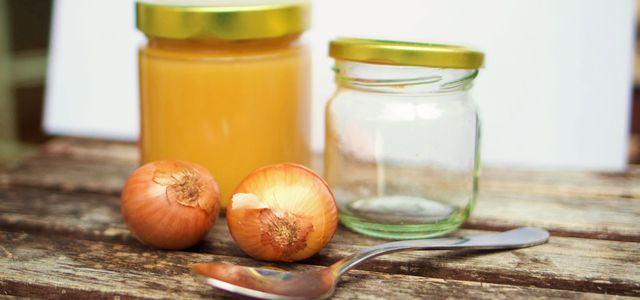
Onion juice is the classic among home remedies: onions have an antibacterial effect and you can use them in combination with honey to make an effective cough syrup yourself. We’ll show you how easy it is to produce onion juice against coughs yourself.
And this is how you make your own onion juice for coughs:
- Peel an onion, cut them up, put the pieces in a glass or mug.
- Pour two tablespoons of liquid honey about that. For the vegan variant or if there is no honey in the house, sugar or other vegan honey alternatives are also suitable.
- Leave this on for several hours, or at best pull overnight.
- Then pour off the resulting liquid.
- Your homemade cough syrup, which you put on a spoon, is ready several times a day take to you.
You see: Making cough syrup yourself is super easy!
Also read:
-
Home remedies for dry coughs: These tips work quickly and safely
-
If your throat scratches: home remedies for tonsillitis
- Lower fever: home remedies for high temperature
Onion juice for coughs: simple home remedies
The onion is a traditional home remedy for sore throats, earaches and insect bites (EMA) and has been used for centuries. According to tradition, it has an anti-inflammatory, germicidal, antibacterial and analgesic effect.
You are probably asking yourself: “Onion juice for coughs? Doesn’t that taste disgusting? ”The taste is surprisingly tolerable and sweet as sugar thanks to honey or sugar.
By the way: onions can also help with earache. More on this: Home remedies for earache

Onion juice alternatives: cough teas
Of course, onion juice is just one of many home remedies. Infusions with garlic, ginger, sage or salt water are also considered natural and effective home remedies for colds.



In addition to the onion juice recipe mentioned above, this version with rock candy is also effective:
- To do this, cut an onion into small pieces and boil it with a little rock sugar over low heat.
- You press the cooled brew through a kitchen towel and drink the onion juice obtained in this way, spoon by spoon.
- The ingredients of the juice are supposed to work against inflammation and germs and soothe your bronchi and the urge to cough.
As with a cold, it is important that you drink a lot when you cough. Cough teas not only help with the medicinal plants they contain (e.g. thyme, aniseed, ivy). The liquid that you consume through the tea moisturizes the mucous membranes, liquefies thick mucus and relieves the urge to cough.
- Especially help against coughs thyme and Ribwort plantain. Thyme has a bronchodilator, antitussive and antibacterial effect. You can also use thyme oil as a mouthwash for a sore throat. The home remedy ribwort stimulates the immune system and has an antibacterial effect; the plant also has a positive effect on the structure of the mucous membrane. Pour the thyme or ribwort leaves into tea or boil them into a syrup.
- Homemade ginger tea has a similar effect, thanks to its immune-stimulating, disinfecting effect: cut a piece of ginger into small pieces and boil it with water.
- Diluted apple cider vinegar is considered an effective expectorant. Simply mix 2 tablespoons of apple cider vinegar with 200ml of water and gradually drink either cold or warm (then preferably sweetened with a little honey).
- Also Sage tea helps with a cold. More on the subject here: Cold tea: These varieties help with coughs, runny nose and sore throats.
- With a dry cough, a cup can hot milk with honey have a calming effect.
Proven home remedy for coughs: inhale
Hot steam has a beneficial effect on coughing and phlegm. The easiest way to inhale is to use an inhaler. Or, you can simply pour hot water into a bowl and slowly inhale the steam with a towel over your head. You should inhale three to four times a day. If you add a little sage to the infusion, your mucous membranes will be soothed even more. Dry cough is relieved by inhalation, thick mucus is loosened.
Good to know: Coughing is a natural reaction of the body to remove pathogens from the airways. With a few effective home remedies for coughs, you can often relieve the irritation and help the body recover. However: If the cough lasts longer, is painful or accompanied by other symptoms, or if you suspect a viral infection, it is essential to get medical advice!
Read more on Techzle.com:
- Strengthen the immune system: 10 natural tips for better defenses
- Planting ginger: you have to consider this when growing
- Fever thermometer test: that’s what Öko-Test says